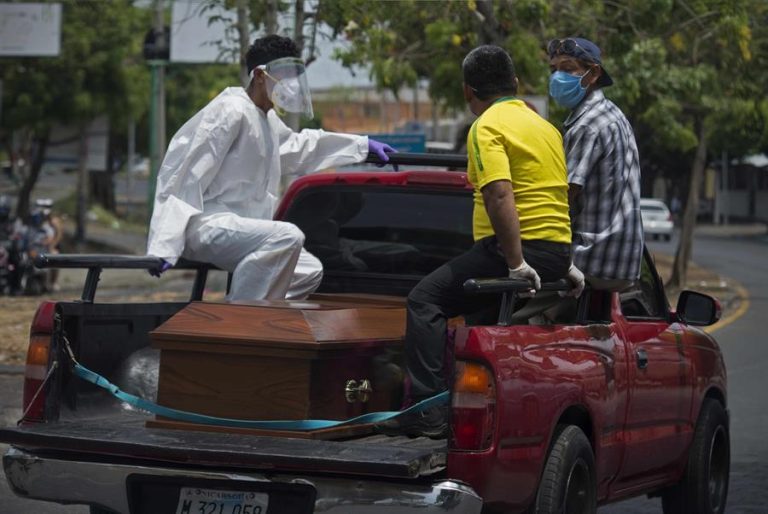16 de mayo 2020

Children of Exile: The Births “Sowing Hope” in the Camp of Nicaraguan Farmers

PUBLICIDAD 1M
PUBLICIDAD 4D
PUBLICIDAD 5D
Images of Covid-19 in the country include pick-up trucks from the Health Ministry carrying sealed coffins directly to the cemeteries

The COVID-19 pandemic in Nicaragua is being experienced in a particularly unique way. Without any restrictions and with hardly any official information about its spread, in the middle of a both socio-political crisis and an economic recession, it’s walking a tightrope while blindfolded.
While neighboring countries report dozens of deaths and hundreds of confirmed cases of COVID-19, Nicaragua – where borders haven’t been closed, schools remain open, and the government is holding more than 1,000 large-scale activities nationwide every week – reports only 25 patients and 8 deaths.
The official numbers are in direct contrast to scenes that are ever more common: people in facemasks avoiding each other, people suddenly falling down in the streets, pick-ups from the Health Ministry transporting sealed caskets directly to the cemeteries, hospitals surrounded by Sandinista paramilitary who threaten anyone trying to record the scene.
Data from the independent organization “COVID-19 Citizen Observatory” [Observatorio Ciudadano] indicates that the true number of people infected with the novel Coronavirus in Nicaragua has now passed 1,200, and the illness has now caused some 200 deaths.
A visit to the Managua markets makes the statistics from the independent Observatory group more credible than the government’s total refusal to admit to the presence of local community transmission.
There’s no social distancing here. It would be impossible to comply with it in a corridor three feet wide, packed with people coming and going in a hurry and sellers that jump out suddenly to grab the hand of a prospective client and invite them into their stall to buy.
At the bus stops, the story isn’t very different. Although some try to maintain two arms’ distance from the others, this ends at the moment of getting on the bus, either because the driver’s in a hurry or the people getting on from behind are surging forward.
At any rate, in Nicaragua, a bus almost never travels half-empty, so that at times the passenger wearing a mask is being breathed on by the one talking to their neighbor while standing, and with no protection.
The differences among the social classes are obvious in the supermarkets. At the high-end ones, they’ve taken measures like in the banks: measuring your temperature; offering alcohol wipes or hand sanitizer; and placing a rug with a bleach solution in the entryway. In these places, the clients maintain their distance.
In the more popular, lower-priced supermarkets, there’s barely a soapy liquid or sanitizer available for hands, while some of the clients pay no heed to social distancing. The same thing occurs at the baseball games or other sports competitions that they haven’t shut down in Nicaragua, although in the fields and stadiums sometimes there’s not even water for washing hands.
The COVID-19 pandemic has also brought large crowds to the hospitals. The lines of people standing by the entrance to the hospital centers are ever longer. The uncertainty due to the lack of available information means that the patients won’t go alone to a medical visit, since they fear it could be the last time the family sees them.
Unlike other times, the people standing in line are reticent about their problems, with or without social distancing. The fear coincides with stories of family members of some COVID-19 patients who were allegedly threatened by the Sandinista paramilitary, and told not to speak about the pandemic or they could suffer reprisals.
The dilemmas regarding sending the children to school or not, spending money on a taxi instead of taking the bus, stocking up for a possible surprise quarantine or saving that money, are not discussed in public.
This is because Nicaragua was already living through a bloody political crisis before the arrival and spread of the SARS-coV-2 Coronavirus.
This crisis has pitted President Daniel Ortega and his followers against an apparent majority of Nicaraguans. The confrontation began with an explosion of widespread anti-government protests in 2018. Shortly after, the combined forces of the government, including paramilitary forces, carried out armed attacks and later extrajudicial executions that left hundreds dead, imprisoned or missing, thousands of wounded and tens of thousands in exile.
According to the dissident factions, the government utilizes the Sandinista militants to watch for anyone expressing a rejection of Ortega and his family, or using a cellphone to record video of a state institution, That person is then arrested, based on a police state order emitted in September of 2018.
The situation described above is exacerbated by an economic situation that offers no relief. Consumer advocates maintain that grievances about the high cost of fuel and petroleum products are permanent, and that customer complaints of alleged fraud on the part of the energy distribution company have tripled.
None of that can be noted at certain nightclubs, where some attend as if there were no political or economic problems, nor a pandemic. These difficulties also go unnoted in the activities promoted by the government and attended by Sandinista supporters. Some of these supporters are also sent to do house-to-house visits, although they’re often rejected.
This is life under the pandemic in Nicaragua, one where memes have captioned it as “Every man [and woman] for themselves!”
Archivado como:
PUBLICIDAD 3M
Agencia de noticias internacional con sede en Madrid, España. Fundada en Burgos durante la guerra civil española en enero de 1939.
PUBLICIDAD 3D